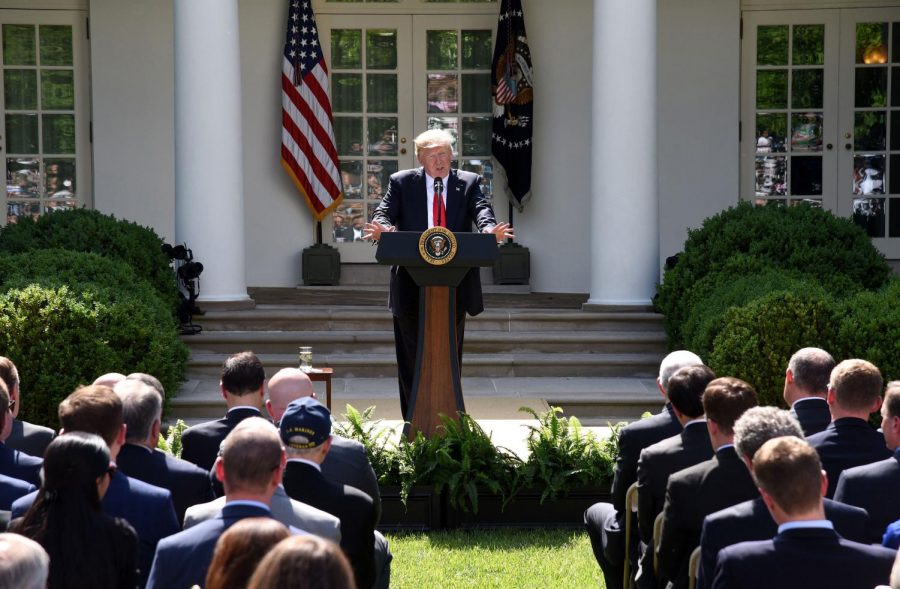What on Earth
Recent UN reports predict grim future without big change
President Donald Trump makes a statement on The Paris Climate Change Accord during an event in the Rose Garden of the White House, on June 1, 2017 in Washington, D.C. (Olivier Douliery/Abaca Press/TNS)
December 24, 2018
America rests upon the rights to life, liberty and the pursuit of happiness -but how long life will last on earth depends upon the decisions humanity makes today. Both the United Nations and the United States have released reports regarding the state of the climate and the impacts we are likely to face without change.
The United States government release of a 1,600 page “Climate Science Special Report,” along with the UN’s Intergovernmental on Climate Change special report “Global Warming of 1.5 Degree Celcius,” released in October, has increased stress on creating environmental policy worldwide.
“One of the key messages that comes out very strongly from this report is that we are already seeing the consequences of 1°C of global warming through more extreme weather, rising sea levels and diminishing Arctic sea ice,” said Co-Chair of IPCC Working Group I, Panmao Zhai, in a press release.
Since the industrial revolution, human industries have been releasing more carbon dioxide into the air than the natural level, which traps heat, causing a rise in global temperatures. In 2015, global temperature rose one degree celsius above pre industrial temperatures. Although that does not sound like enough change to threaten the stability of life on earth, it has proved to do so.
The report has found that it would take “rapid and far-reaching transitions in land, energy, industry, buildings, transport, and cities,” in order to limit global warming to 1.5 degrees Celsius. By 2030, human-caused emissions of carbon dioxide would need to fall by 45 percent from 2010 levels in order to limit catastrophic changes to the planet.
“Limiting warming to 1.5 degrees C is possible within the laws of chemistry and physics but doing so would require unprecedented changes,” said Co-Chair of IPCC Working Group III, Jim Skea, in a press release.
When the United Nations Framework Convention on Climate Change adopted the Paris Agreement in 2015, the IPPC began their report. The report was based on more than 6,000 scientific findings and will be in consideration during the Katowice Climate Change Conference in December, when governments review the 2015 plan to battle greenhouse gas emissions and decrease the effects of climate change.
“The good news is that some of the kinds of actions that would be needed to limit global warming to 1.5 degrees Celsius are already underway around the world, but they would need to accelerate,” Co-Chair of Working Group I Valerie Masson-Delmotte said.
They will decide if wildfires are allowed to burn greater than they ever have before, they will decide if the loss of human life- even mass extinction- is worth less than an unrestricted economy.
— Margaret Debenport
The United States’ “Climate Change Special Report,” cites “a likely human contribution of 93 to 123 percent of the observed temperature change. It is extremely likely that more than half of the global mean temperature increase since 1951 was caused by human influence on [the] climate.” Even though it may rest upon the government to regulate industrial emissions, it is clear that each person will have to take charge for their impact on the environment as well.
“I think climate change will affect us, but I just think that the solution is not cleansing the air of emissions right now. I think the solution is finding the actual emitters of said emissions and then focus on cleansing emissions,” junior Remington Cook said. “You don’t clean before you’re about to be dirty again.”
According to a survey conducted by the New York Times, only 57 percent of Texans are somewhat worries about climate change. The U.S. reports that Texas ranks number one in spending on weather related disasters, and will face more and more extreme events as the effects of climate change unravel.
“I’m not saying global warming’s not an issue, it is, but I think it’s one that is futile to deal with right now,” junior Remington Cook said. “You can focus on cleansing the ozone now and waste billions of dollars doing it, but people still drive cars and carbon emissions are still gonna be a problem, so in a matter of years, you’ll just be back where you started.”
In June 2017, President Donald Trump announced the United State’s withdrawal from the Paris Agreement. The U.S. alone is responsible for 15% of the world’s carbon dioxide emissions, and although the withdrawal from the agreement was said to be caused by the negative impact it had on the economy, there was no mention of the effect less restricted emissions would have on the environment.
At the UN’s Katowice Climate Conference, the decision will be made by nations to fully implement the Paris Agreement will allow for the goal to keep the global temperature change under 1.5 degrees Celsius reachable. The decisions Trump and other world leaders make regarding the limiting of climate change will affect whether future generations are able to breath clean air. The decisions they make could displace every person living near the coast.
“This report gives policymakers and practitioners the information they need to make decisions that tackle climate change while considering local context and people’s need,” said Debra Roberts, Co-Chair of IPCC Working Group. “The next few years are probably the most important in our history.”




















